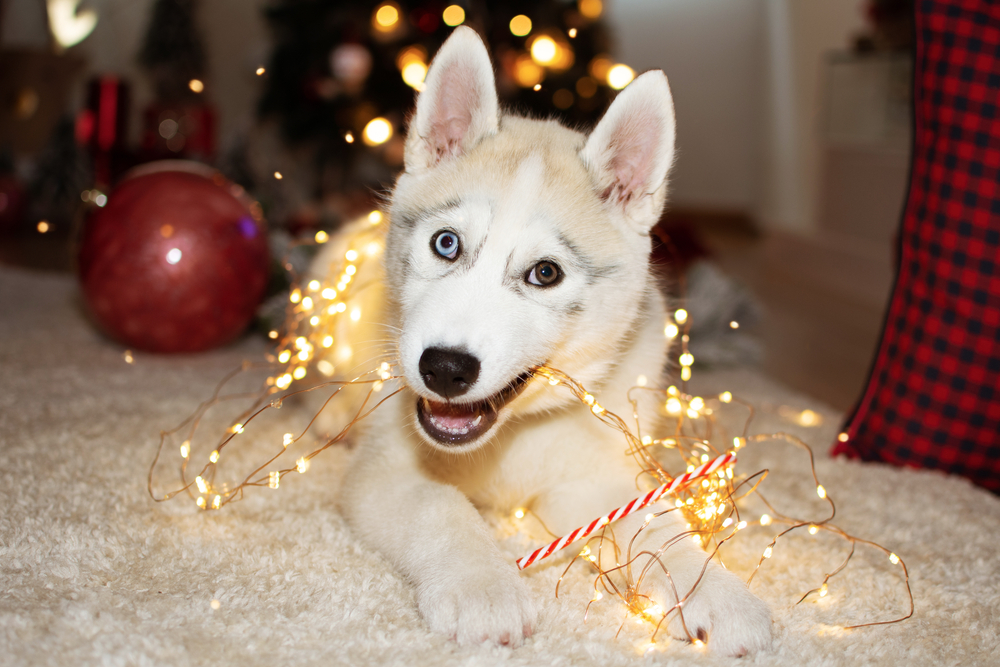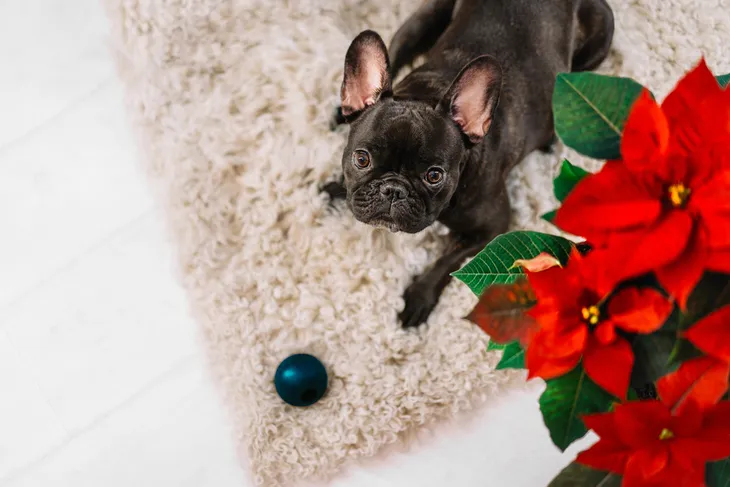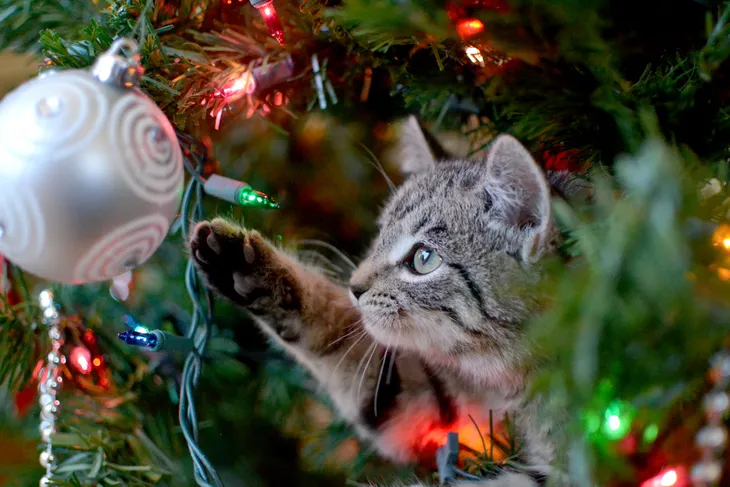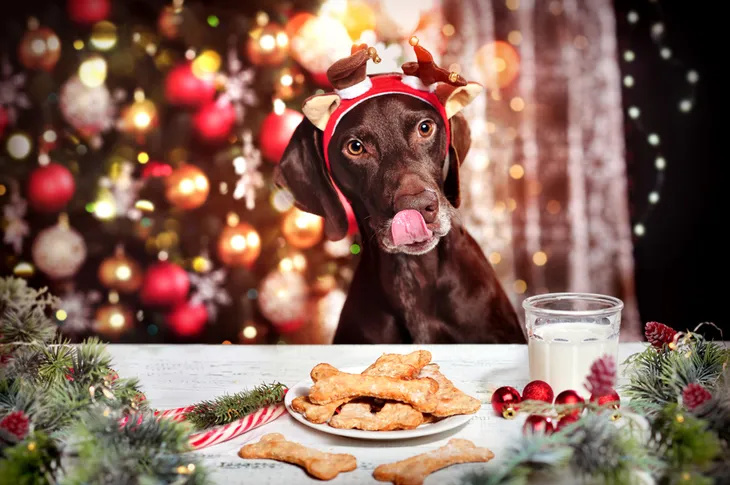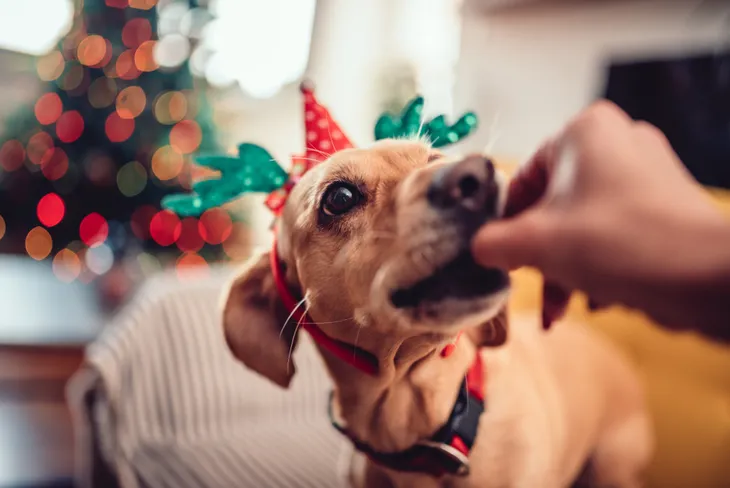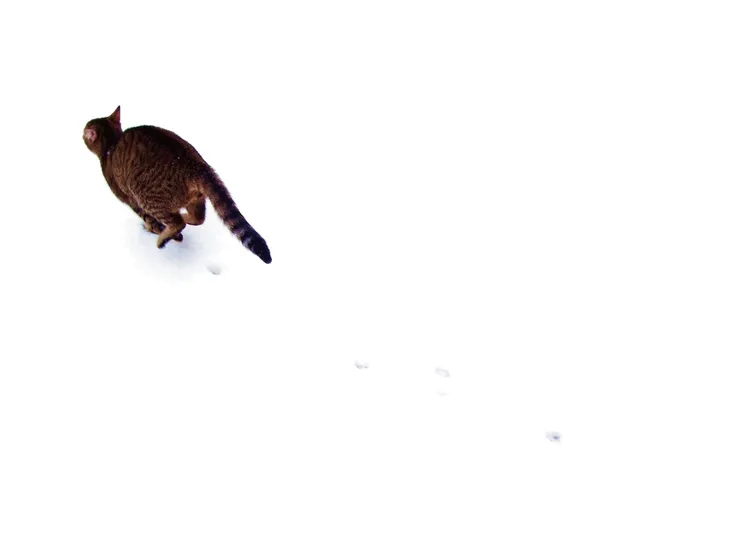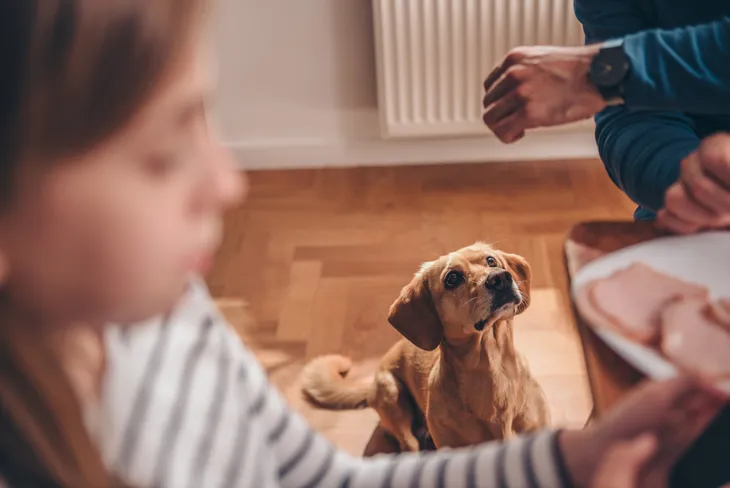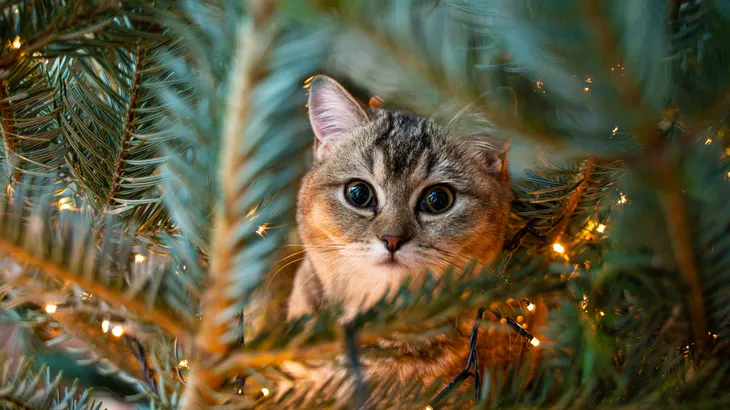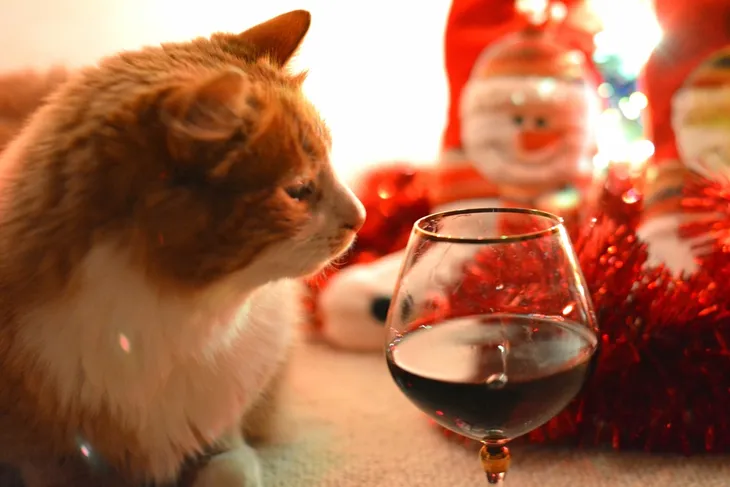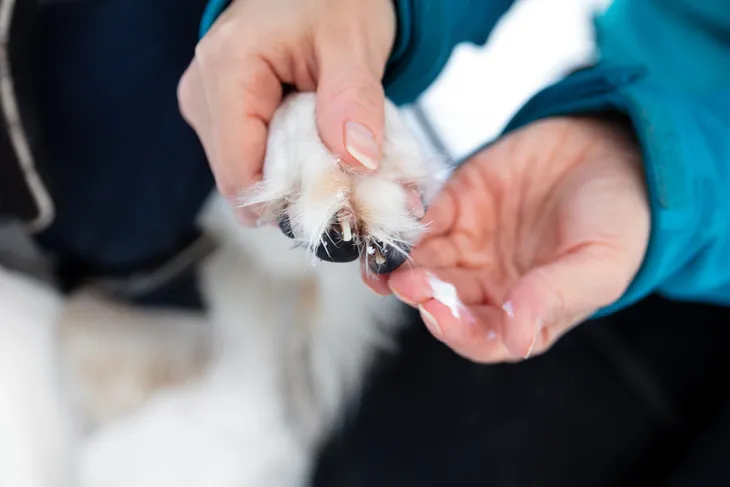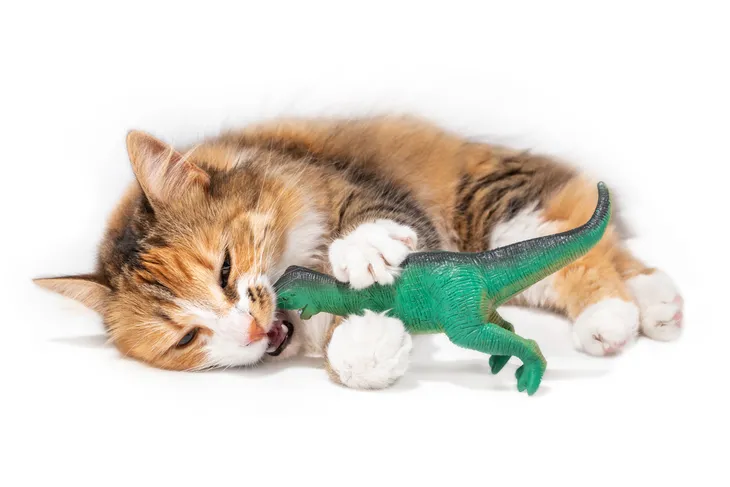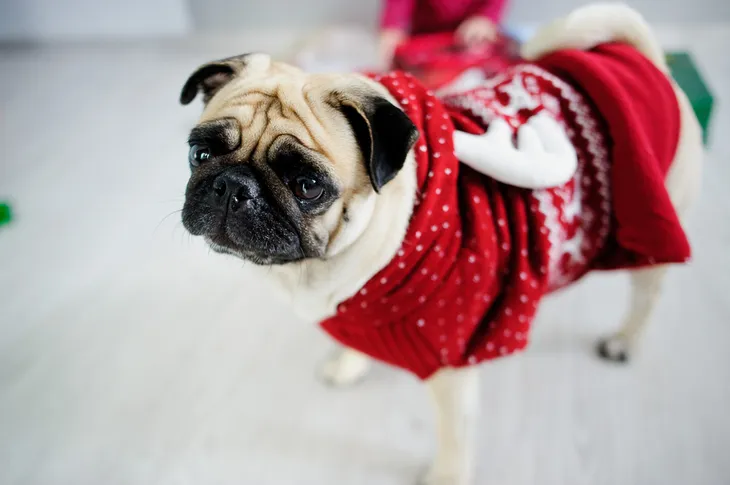The winter holiday season is such a joyous time with lots to celebrate. But along with all the merriment and fun there are some risks, particularly for our furry friends. All the things we love most about them, their curious and playful nature, is what gets them into the most trouble during the holiday season.
The holidays should be a time for festivity and cheer—for humans and pets—so let’s pinpoint a few not so merry dangers to help keep our furry friends safe this Christmas season…
Seasonal Plants
Poinsettias, mistletoe, holly, amaryllis, balsam, pine, cedar, and holly sure lend charming sights and smells to our home décor around the holidays. Often, guests give holiday plants as gifts without ever anticipating the hazards they pose to our pets.
According to the American Veterinary Medical Association (AVMA), these flowers and festive plants can result in an emergency trip to the vet if pets get a hold of them. They are dangerous and some even poisonous if ingested. For more information, the ASPCA has a detailed list of plants that are toxic to dogs and cats.
Symptoms can include vomiting, gastrointestinal upset, drooling, diarrhea, a drunken appearance, fainting, seizure, and even death.
Tinsel and Ornaments
What’s a tree without some festive decor? Tinsel and ornaments are certainly what provides the essence of a tree and what makes it Christmas, but low hanging and shiny ornaments are very attractive to pets. Especially cats.
We don’t expect people to not hang ornaments on their tree, but we suggest avoiding the lower branches. If hanging ornaments here, consider only putting wood, metal, resin-cast, or ornaments made from other durable materials. The U.S. Food & Drug Administration (FDA) also warns pet owners to keep salt-dough ornaments high as they contain a great deal of salt which can be fatal if consumed by pets.
Similar to other decor, the allure of hanging ornaments is for pets to play with them, become tangled in things like tinsel and ribbon, or chew on ornaments only for them to become lodged in their intestinal tract or become a choking hazard.
Sweet Holiday Treats
It might seem like nothing to slip the family dog a few Christmas cookies. However, many baked goods and sweets contain xylitol, an artificial sweetener that can cause life-threatening problems for pets. It can also be found in other popular food items like holiday mints, candy, chewing gum, some peanut butters, baked goods, and personal hygiene products like tooth past and mouthwash, notes the FDA.
When a dog ingests xylitol the symptoms will appear quickly. “Vomiting is generally first, followed by symptoms associated with the sudden lowering of your dog’s blood sugar (hypoglycemia), such as decreased activity, weakness, staggering, incoordination, collapse, and seizures,” writes the FDA.
Chocolate
Chocolate is an irresistible treat for most of us, especially around the holidays. It’s often a main ingredient in baking, treats, and even some drinks. It’s an essential part of the holidays! While we all enjoy eating it, that doesn’t mean it’s safe for our pets.
It can be hard to know how harmful chocolate will be because the toxicity varies based on many different factors, explains the AVMA. You have to take into account the size of the pet, type of chocolate, and the amount they ate. To be safe, we suggest avoiding chocolate altogether. Don’t feed pets any food that contains chocolate and don’t leave chocolate or foods containing chocolate within reach for them to help themselves.
While bakers chocolate (or dark chocolate) is the most toxic for pets, consider that all chocolate contains caffeine and theobromine at some levels. If a pet ingests chocolate, call your vet immediately.
Holiday Escapes
During the holidays people are always heading in and out to events and parties. For those who are hosting, new people may be arriving every few minutes. During this time, we often forget to keep an eye on curious pets lingering nearby, waiting for their chance to dash out the door. The biggest risk is for shy or skittish pets who may become overwhelmed by all the activity and run outside.
If you’re planning on hosting guests over the holidays, particularly those who are not used to pets, try to put measures in place to prevent any pets from escaping. Either keep them in an area where they cannot run and greet guests at the door, or warn guests ahead of time to keep the doors shut and watch for pets at their feet. It might also be a good idea to talk to your vet about having animals microchipped or update any identification tags in case there is an escape.
Table Scraps
While it might be hard to not give into that sweet face under the table, it’s never a good idea to feed pets scraps or leftovers. The AVMA warns that turkey and turkey skin especially is a no no. Even if it’s given in small amounts it can cause pancreatitis, a life threatening condition. Other table scraps to avoid are gravy and meat fat. Any kind of poultry bones (particularly turkey) should never be given for them to chew on because the BCSPCA warns they can splinter and cause serious injury. “Bone fragments could cause intestinal blockages or lacerations,” adds the source.
Most pet owners already know this, but it’s worth mentioning again. Foods like onions, raisins, and grapes are poisonous to pets. “During the holidays, when our own diets tend towards extra-rich foods, table scraps can be especially fattening and hard for animals to digest and can cause pancreatitis,” writes the AVMA.
Christmas Trees
A Christmas tree is a staple decoration in most peoples homes during the holidays. Not surprisingly, pets are going to be curious about this new (and big) tree that has suddenly appeared in their home. Dogs will want to go up and sniff it, while cats might try to climb it! Both of these innocent endeavours cause lead to a toppling tree.
Combat a toppling tree by making sure it is secure. MedVet suggests using a stable tree stand or even tie the top or sides of the tree to a hook in the ceiling or adjacent wall. Try to keep pets away from the tree as much as possible. Both cats and dogs might be inclined to drink from the water basin of a live tree which can cause stomach upset, and evergreen needles can get stuck in their intestines and require surgery to remove.
Lights and Wires
Nothing sets a better ambiance than twinkling white Christmas lights. People often have them wrapped around their tree, along the outside of their house, or used as decor inside. While they are pretty, they are yet another holiday hazard for pets.
If a pet is curious enough, they might try to chew through the cords of electric lights which can cause burns or even electrical shock. To help, take precautions by limiting their exposure to the lights. Purchase electrical cord covers and organizers. You should also tuck loosely dangling lights away and out of sight.
Alcohol
You’re probably wondering what kind of pet owner finds it funny to get their cat or dog drunk! Hopefully a run in with alcohol for a pet is never intentional. Accidents like this do happen when drinks are left unattended on low tables or are unwittingly used in recipes for baked goods (i.e. fruit cake).
Obviously alcohol is not meant for animals, and according to MedVet if ingested it can lead to coma or even be fatal. Even little amounts are dangerous. For example, MedVet notes that just 1-ounce of alcohol can fatally harm a small cat or dog. Alcohol in any form can make your cat or dog extremely ill and can even cause severe alcohol poisoning. Intoxicated pets may vomit, appear drunk or confused, experience diarrhea, seizures, and even respiratory failure.
Anti-Freeze and Ice Melt
This one is mainly for dogs who are being walked during the winter months and in areas that get cold enough to use these products. Ever notice them lifting their paws after walking along a salted sidewalk? That’s because anti-freeze and rock salt are harmful chemicals.
According to MedVet, anti-freeze is made with the chemical ethylene glycol which can be fatal to animals. Rock salt is another harmful product that results in a chain reaction of dangers. “If a pet walks on it, it can irritate paw pads, causing pets to lick or swallow the rock salt, which can result in agitation and vomiting,” writes the source. Pet owners are advised to avoid anti-freeze and rock salt, invest in boots for their dogs, or purchase a pet-safe product.
New Toys and Batteries
If there are children in the house, there is likely going to be a lot of new toys and batteries coming into the house around Christmas time. To keep pets safe, make sure small toys and loose batteries are not laying around. MedVet warns that batteries, board game pieces and other small household items may contain zinc which can cause pancreatitis and renal damage if ingested.
When purchasing toys for pets, the BCSPCA suggests avoiding toys with small or soft pieces that can easily be chewed off and swallowed. The source also suggests swapping plastic bones for nylon ones because they tend to splinter less. Always monitor them while they are playing with toys and inspect them regularly. Discard toys that are deteriorating.
Christmas Sweaters
Who doesn’t love a good ugly Christmas sweater party? These types of events are a holiday favorite for many. While they might look funny on us, pet owners should refrain from putting them on their dogs and cats. Whether it’s for a party or with the good intentions of keeping them warm, Christmas sweaters do present a hazard.
If a pet owner is putting any type of clothing on their animal, they should make sure they can move freely, breathe easily, and are still able to bark and meow, says MedVet. Don’t purchase sweaters with dangling parts on them or have anything that can easily be torn off or swallowed. If a pet doesn’t like wearing the sweater, don’t force them.
New Year’s Eve Fireworks
The New Year’s Eve countdown is one of the most celebrated events around the world. It’s something we all take part in no matter what religion, culture, or where in the world we’re located. Most people will partake in celebrating another year around the sun.
A popular part of this celebration is to use fireworks. While these types of things are certainly fun and entertaining for us to watch, they can be extremely harmful to pets. Fireworks are one of the biggest contributors to animals escaping and going missing.
Unfortunately, aside from not bringing them to firework shows, pet owners aren’t always unable to anticipate this holiday hazard. Especially if they are set off without their consent by nearby neighbors. The best thing to do is avoid leaving dogs unattended outside on NYE and make sure they are secure at all times.
